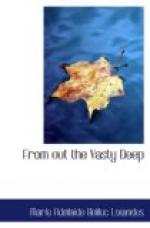Panton turned to him quickly in the rushing wind: “Yes, something has happened. But I didn’t think it worth writing to you about. An extraordinary advertisement appeared about a month ago in one of the popular Sunday papers, and Mrs. Bilton—you remember the woman—?”
Varick shook his head. He looked exceedingly disturbed and annoyed, and the man now sitting by his side suddenly regretted that he had said anything about that absurd advertisement.
“Mrs. Bilton was the woman whom I recommended to you as a charwoman, soon after you were settled down at Redsands.”
“Yes, I remember the name now. What of her?”
“She came up to see me one evening about a month ago, and she brought the paper—the News of the World I think it was—with her.”
“Yes,” said Varick shortly. “Yes—go on, Panton. What was in the advertisement?”
“The advertisement simply asked for information about you and your doings, past and present, and offered a reward for any information of importance. It was very oddly worded. What I should call an amateur advertisement. Mrs. Bilton came up to consult me as to whether she should write in answer to it. Of course I strongly advised her to do nothing of the kind. As a matter of fact”—Dr. Panton chuckled—“I have reason to believe she did write, but I need hardly say that, as far as she was concerned, nothing came of it!”
“I wish you could remember exactly how the advertisement was worded?” said Varick. It was clear that he felt very much disturbed.
“I’m sorry I didn’t keep a copy of it; all I can tell you is that it asked for information concerning the past life and career of Lionel Varick, sometime of Redsands and Chichester.”
“Chichester?” repeated Varick mechanically.
The name of the Sussex cathedral town held for him many painful, sordid memories. His first wife, the woman whose very existence he believed unknown to everyone who now knew him, with the exception of Blanche Farrow, had been a Chichester woman. It was there that they had lived in poverty and angry misery during the last few weeks of her life.
“Yes, that’s all I remember—but I’ve put it more clearly than the advertisement did.”
“What an extraordinary thing!” muttered Varick.
“I don’t know that it’s so very extraordinary. It was that woman Pigchalke’s doing, obviously. As I told you the last time we met, I felt that she would stick at nothing to annoy you. She’s quite convinced that you’re an out-and-out villain.”
Dr. Panton laughed. He really couldn’t help it. Varick was such a thoroughly good fellow!
“I wonder,” said Varick hesitatingly, “if I could get a copy of that Sunday paper? I feel that it’s the sort of thing that ought to be stopped—don’t you, Panton?”
“I’m quite sure it didn’t appear again in the same paper, or I should have heard of it again. That one particular copy did end by going the whole round of Redsands. I went on hearing about it for, I should think,—well, right up to when I left home.”




